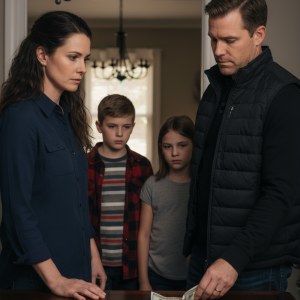After the reunion, I checked my bank account and felt the floor drop out from under me. Zero. Not a penny left. Even my savings—gone.
My hands were shaking when I confronted my brother-in-law, Garth. He sipped his beer, smirked, and said, “Relax. We needed it more than you.” Then he winked.
Winked.
I felt the heat rise in my chest, but I didn’t shout. I just grabbed my bag and said, calm as ever, “Then you won’t mind what happens next.”
They thought I was bluffing.
Ever since my dad passed and we divided the estate, things felt… off. My sister Seraphine married Garth three years ago, and soon after, little things started vanishing. Mom’s antique watch? “Lost.” A check from the lawyer? “Misplaced.” Then suddenly Seraphine had a Tesla she claimed she “won.”
I kept quiet. But I took notes. Screenshots. Venmo receipts. Photos of opened mail. A running log of “coincidences.”
I never said a word—until now.
As they lounged in the living room, Garth with his feet up on my mom’s ottoman and Seraphine rocking her toddler like a human shield, a loud bang echoed through the house.
The front door slammed open.
And there he was—Detective Enzo Mateo. Badge out. Voice sharp.
“Nobody move.”
Garth’s face turned chalk-white.
Because this wasn’t just any detective—it was the same one who’d put Garth behind bars for fraud in Spokane years ago. And he’d been watching. Waiting.
The moment he saw me, he nodded. “Good work,” he murmured.
Then, right in front of the entire family, Garth bolted.
Out the sliding glass door. Full sprint. Tripped over the garden hose. Face-first into a bush.
Detective Mateo didn’t even blink. “Get him,” he said to his partner. “He’s not slipping away this time.”
Mom stood in her hallway robe, speechless.
She looked straight at Seraphine and whispered, “What did you let him do?”
Seraphine didn’t answer. She just sat there, rocking her baby, eyes blank.
Officer Mateo turned to me. “Walk me through it.”
I opened my laptop and showed him everything—my file folder, logs, emails, a recording of Seraphine joking about how “Garth figured out the routing number.”
His jaw tightened.
“He scammed my aunt for thirty grand back in 2011,” he said quietly. “Did eighteen months. I knew he’d pop up again.”
The truth unraveled fast.
Garth had created a joint account under his and Seraphine’s names. Last fall, when “helping” Mom organize her passwords, he got access to multiple family accounts. He drained them—mine included.
My emergency fund. My travel savings. My automatic deposits.
Gone. $43,000. Cleaned out.
No warning. No apology.
I didn’t cry. I didn’t scream. I went to the courthouse and filed a civil suit the next morning.
Because if they thought they could rob me blind and walk away, they had no idea who they were dealing with.
Two days later, Seraphine showed up on my porch. No makeup. Tears running down her cheeks. She held a Ziploc bag full of receipts.
“I didn’t know it was this bad,” she whispered. “He said you were fine. That it was temporary. I’m sorry.”
I stared at the girl who used to share my pillow during thunderstorms.
And I said the truth I’d buried for too long:
“You knew who he was when you married him. And you let him take us all down with you.”
Then I shut the door.
The trial dragged on.
Garth tried every delay tactic—needed more time, more evidence, more “support.” Meanwhile, the money was gone—blown on crypto, gambling apps, and a flat-screen he gifted himself for “stress relief.”
But the community wasn’t quiet.
Neighbors began knocking.
Mr. Daejung brought a casserole and said, “He borrowed $2,000 from me—for your mom’s surgery. Never saw it again.”
A church friend said Garth offered to help her with a small business loan. She never got it—but someone used her name to open a fake eBay account.
And it wasn’t just Garth.
Seraphine had helped. Forwarded emails. Signed documents. Played the innocent.
She wasn’t silent. She was complicit.
By the time the trial began, I wasn’t alone.
There were five of us pressing charges.
Garth pled guilty to wire fraud and identity theft. Five years in prison.
Seraphine didn’t go to jail, but the judge’s words echoed in the courtroom: “You were not naive. You were willfully negligent.”
She was ordered to pay restitution. She cried through the hearing.
I didn’t.
That night, I sat on the porch wrapped in a blanket, staring at the stars.
Mom came out, sat beside me, took my hand.
“You were the only one who didn’t look away,” she said softly.
I nodded, throat tight. “I just wish I’d done more. Sooner.”
“You did enough,” she said. “You did right.”
Over time, I got some money back. Not all, but enough to exhale again.
More than that, I got clarity.
Family doesn’t mean protection from consequences. Silence isn’t love—it’s cowardice.
Seraphine moved to Arizona. Sends postcards sometimes. I read them. Occasionally reply. Brief updates about Mom’s health or the flowers blooming in our yard.
I don’t hate her.
But I’ll never trust her again.
Now, whenever I open my bank app, I remember the moment I chose to stop being quiet.
I remember the front door bursting open. The hush that followed.
I remember standing up—for myself, for what’s right.
And I feel peace.
Not because I got revenge.
But because I didn’t let them silence me.





